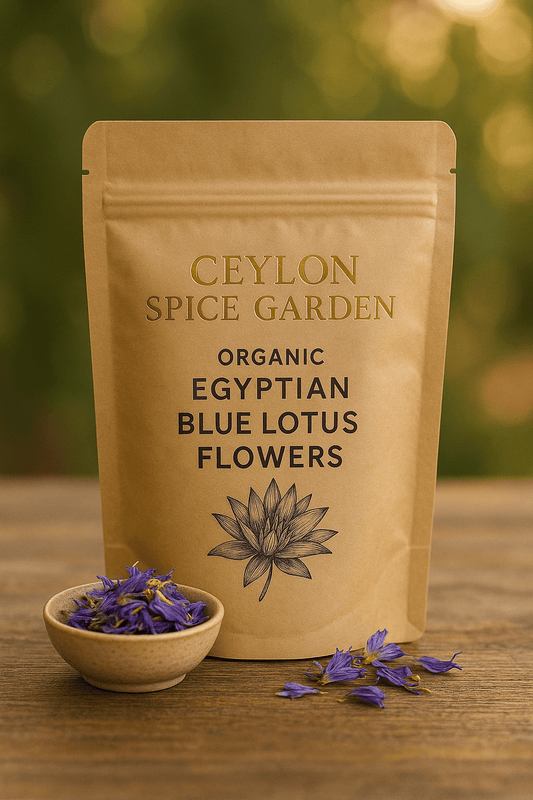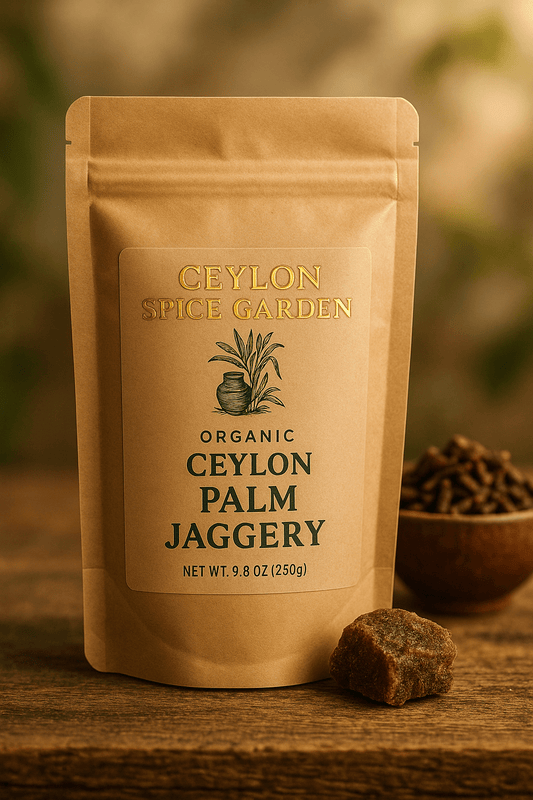
Best Organic Ashwagandha Powder 2025: Quality Buyer's Guide & Brand Comparison
Best Ashwagandha Powder 2025: Complete Buyer's Guide
Table of Contents
What is Ashwagandha and Why Choose Powder?
Ashwagandha (Withania somnifera), also known as Indian winter cherry, is one of the most revered herbs in Ayurvedic medicine. This adaptogenic herb has been used for over 3,000 years to help the body manage stress, boost energy levels, and improve overall vitality.
Ashwagandha powder offers several advantages over capsules and extracts. The powder form allows for better absorption, flexible dosing, and the ability to mix it into foods and beverages. Additionally, high-quality ashwagandha powder retains more of the plant's natural compounds compared to highly processed extracts.
Why Ceylon Spice Garden's Ashwagandha Stands Out
Ceylon Spice Garden sources premium organic ashwagandha roots from sustainable farms in India, ensuring maximum potency and purity. Our traditional stone-grinding process preserves the herb's natural bioactive compounds while maintaining freshness and quality.
Key Quality Indicators to Look For
Organic Certification
Organic ashwagandha powder is free from synthetic pesticides, herbicides, and chemical fertilizers. Look for USDA Organic, NPOP (National Programme for Organic Production), or equivalent certifications. Organic ashwagandha typically contains higher levels of bioactive compounds called withanolides.
Withanolide Content
Withanolides are the primary active compounds responsible for ashwagandha's therapeutic effects. High-quality ashwagandha powder should contain at least 1.5% to 3% withanolides. Premium products may contain up to 5% withanolides for enhanced potency.
Root vs. Leaf Powder
Ashwagandha root powder is generally considered superior to leaf powder. The root contains higher concentrations of withanolides and has been more extensively studied in clinical research. Always verify that the product specifies "root powder" on the label.
Processing Method
Traditional stone-grinding or low-temperature processing preserves the herb's natural compounds. Avoid products that use high-heat processing, which can degrade the active ingredients and reduce effectiveness.
| Quality Factor | Premium Grade | Standard Grade | Low Grade |
|---|---|---|---|
| Withanolide Content | 3-5% | 1.5-3% | <1.5% |
| Organic Certification | Yes | Sometimes | Rarely |
| Third-Party Testing | Yes | Limited | No |
| Processing | Stone-ground | Low-heat | High-heat |
| Price Range (per 100g) | $25-40 | $15-25 | $5-15 |
Science-Backed Health Benefits
Stress and Anxiety Reduction
Multiple clinical studies have demonstrated ashwagandha's ability to reduce cortisol levels and improve stress resilience. A 2019 study published in the Journal of Clinical Medicine found that participants taking 300mg of ashwagandha root extract twice daily experienced a 27.9% reduction in serum cortisol levels compared to placebo.
Enhanced Physical Performance
Research indicates that ashwagandha supplementation can improve muscle strength, mass, and exercise performance. A 2015 study in the Journal of the International Society of Sports Nutrition showed significant improvements in muscle strength and mass in healthy young men taking ashwagandha extract.
Cognitive Function and Memory
Ashwagandha may support cognitive function and memory. Clinical trials have shown improvements in attention, information processing speed, and overall cognitive performance in both healthy individuals and those with mild cognitive impairment.
Sleep Quality Improvement
The herb's adaptogenic properties can help regulate sleep-wake cycles and improve sleep quality. Studies have shown that ashwagandha supplementation can reduce the time it takes to fall asleep and improve overall sleep satisfaction.
Proper Dosage and Timing
Recommended Dosage
The optimal dosage of ashwagandha powder varies depending on the concentration and individual needs. General guidelines include:
- General wellness: 1-3 grams daily (1/2 to 1 teaspoon)
- Stress management: 3-6 grams daily (1 to 2 teaspoons)
- Athletic performance: 5-6 grams daily (2 teaspoons)
- Sleep support: 1-3 grams before bedtime
Best Time to Take Ashwagandha
The timing of ashwagandha intake can influence its effects:
- Morning: For energy and stress management throughout the day
- Evening: For sleep support and recovery
- With meals: To improve absorption and reduce potential stomach upset
- Pre-workout: 30-60 minutes before exercise for performance benefits
How to Take Ashwagandha Powder
Ashwagandha powder can be consumed in various ways:
- Mixed with warm milk and honey (traditional method)
- Blended into smoothies or protein shakes
- Stirred into yogurt or oatmeal
- Brewed as herbal tea
- Mixed with ghee or coconut oil for better absorption
Top Brand Comparison 2025
| Brand | Withanolide % | Organic | Third-Party Tested | Price/100g | Rating |
|---|---|---|---|---|---|
| Ceylon Spice Garden | 4-5% | Yes | Yes | $32 | ★★★★★ |
| Organic India | 2.5% | Yes | Yes | $28 | ★★★★☆ |
| Patanjali | 1.5% | No | Limited | $12 | ★★★☆☆ |
| Himalaya | 2% | No | Yes | $18 | ★★★☆☆ |
| Dabur | 1.5% | No | Limited | $15 | ★★☆☆☆ |
Why Ceylon Spice Garden Ranks #1
- Highest withanolide content (4-5%) in the market
- Certified organic with complete traceability
- Traditional stone-grinding process preserves potency
- Comprehensive third-party testing for purity and potency
- Sustainable sourcing practices
- Money-back satisfaction guarantee
Complete Buying Checklist
Essential Questions to Ask
- Is the product made from ashwagandha root (not leaf)?
- What is the withanolide percentage?
- Is it certified organic?
- Has it been third-party tested for purity?
- What processing method was used?
- Does the company provide a certificate of analysis?
- What is the country of origin?
- How fresh is the product (harvest date)?
Red Flags to Avoid
- Extremely low prices (often indicates poor quality)
- No mention of withanolide content
- Unclear labeling about root vs. leaf
- No organic certification when claimed
- Missing third-party testing information
- Unrealistic health claims
- Poor packaging that doesn't protect from light and moisture
Storage and Usage Tips
Proper Storage
To maintain potency and freshness:
- Store in a cool, dry place away from direct sunlight
- Keep in an airtight container
- Avoid storing in the refrigerator (moisture can cause clumping)
- Use within 2 years of purchase for best results
- Keep away from strong-smelling substances
Maximizing Absorption
To enhance the bioavailability of ashwagandha powder:
- Take with healthy fats (milk, ghee, or coconut oil)
- Consume with warm liquids rather than cold
- Take consistently at the same time each day
- Avoid taking with caffeine, which may counteract stress-reducing effects
Potential Side Effects and Interactions
Common Side Effects
Ashwagandha is generally well-tolerated, but some people may experience:
- Mild stomach upset (especially on empty stomach)
- Drowsiness (when taken during the day)
- Headache (rare, usually with high doses)
- Skin rash (allergic reaction)
Who Should Avoid Ashwagandha
- Pregnant and breastfeeding women
- People with autoimmune conditions (multiple sclerosis, lupus, rheumatoid arthritis)
- Individuals taking immunosuppressive medications
- Those with thyroid disorders (consult doctor first)
- People scheduled for surgery (discontinue 2 weeks prior)
Drug Interactions
Ashwagandha may interact with:
- Blood pressure medications
- Blood sugar medications
- Immunosuppressive drugs
- Sedative medications
- Thyroid medications
The Bottom Line
Choosing the right ashwagandha powder requires careful consideration of quality indicators, processing methods, and your individual health goals. Ceylon Spice Garden's premium organic ashwagandha powder offers the highest withanolide content, superior processing, and comprehensive testing, making it the top choice for 2025.
Remember to start with a lower dose, be consistent with your intake, and consult with a healthcare provider if you have any concerns or existing health conditions.











